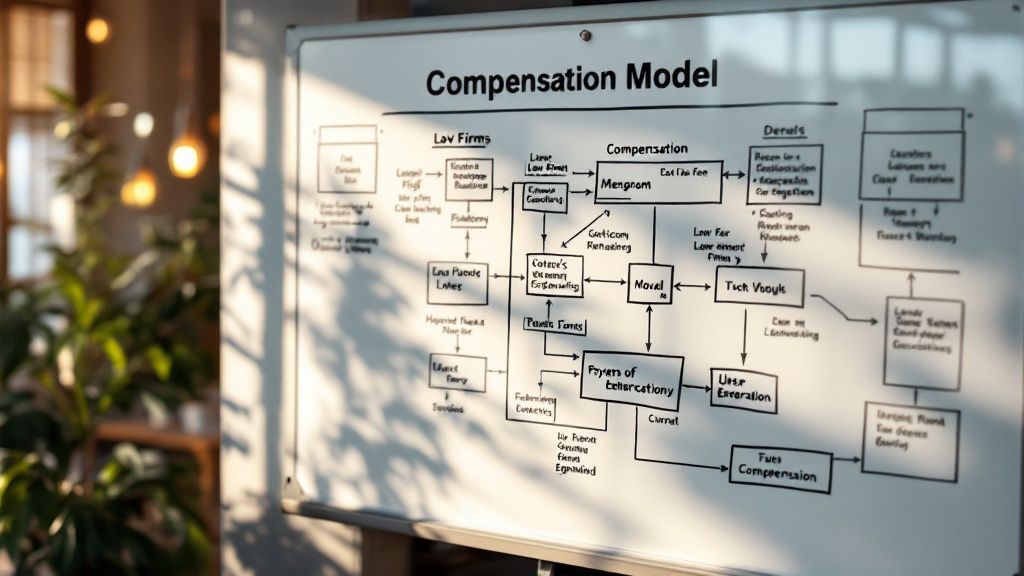Law Firm Partner Compensation: How Top Partners Maximize Their Earning Potential

The Evolution of Partner Compensation Models
Law firm partner compensation is undergoing significant changes, driven by increased competition and evolving client expectations. These shifts affect both how firms structure their compensation agreements and how individual partners plan their career paths. Understanding these changes is crucial for both firms and partners to stay competitive in today's legal market.
From Lockstep to Performance-Based Models
Many prestigious firms traditionally used a lockstep model, where compensation increased based on years of service. While this approach built collegiality and long-term commitment, it often failed to reward individual achievement and business development. For instance, partners who consistently brought in major clients could feel their contributions went unrecognized in a pure lockstep system.
As a result, firms are moving toward performance-based models that reward measurable contributions like working attorney receipts, new business origination, and client satisfaction scores. This shift reflects the growing importance of rainmaking and client relationships in today's competitive environment. Performance-based compensation gives firms concrete ways to recognize and reward partners who excel in these areas.
The Rise of Hybrid Models and Partner Compensation Law Firm Involvement
Recognizing that both lockstep and purely performance-based approaches have limitations, many firms now use hybrid models combining elements of both systems. A typical hybrid might include a seniority-based base salary plus performance bonuses tied to specific metrics. This balanced approach helps firms retain experienced partners while encouraging growth and client development.
These more complex compensation structures require specialized legal guidance. Partner compensation law firms play a key role by ensuring compliance, recommending best practices, and helping develop frameworks that match strategic goals. Their expertise covers everything from equity distribution to performance evaluation to dispute resolution.
Factors Driving Compensation Growth and the Role of a Partner Compensation Law Firm
Partner compensation continues to grow, especially at larger firms. The average partner at Am Law 200 firms now earns over $1.4 million annually. However, significant pay gaps remain between equity and non-equity partners, with equity partners typically earning more than triple their non-equity colleagues. Partners and firms must understand these market dynamics to make informed decisions.
Partner compensation law firms provide crucial insights on compensation trends and benchmarks. This knowledge helps individual partners negotiate effectively and enables firms to develop competitive packages that attract and keep top talent. These firms also advise on structuring compensation to optimize tax treatment and long-term financial benefits. Their role grows more important as compensation models become increasingly sophisticated.
Navigating the Equity Partnership Journey

Becoming an equity partner is a major career milestone for lawyers, but it doesn't happen automatically. Success requires careful planning, a strong grasp of your firm's core values, and often guidance from experts in partner compensation law. Moving up to equity partnership involves much more than high billable hours - you need to show real leadership potential, business development skills, and dedication to helping the firm grow long-term.
Understanding the Evaluation Process
Law firms take a comprehensive approach when assessing potential equity partners. While financial performance matters, it's just one piece of the puzzle. Candidates need to consistently exceed expectations across multiple areas, like bringing in new business and generating significant revenue. For instance, a non-equity partner who regularly lands new clients and builds strong relationships tends to stand out compared to someone who only meets basic billing targets.
The evaluation also weighs factors such as leadership abilities, positive impact on firm culture, and commitment to mentoring junior lawyers. This well-rounded assessment helps firms promote partners who can truly drive growth and stability. Working with experts in partner compensation law gives aspiring partners insight into these criteria and strategies to effectively showcase their strengths.
Metrics that Matter: Beyond Billable Hours
Although billing targets are important, making equity partner requires excelling in other key areas. Client origination, retention rates, and matter profitability become increasingly critical. Think of it like constructing a building - billable hours provide the structure, but client relationships form the essential foundation. Without solid client relationships, a partner's practice won't thrive over time.
Taking on leadership roles within the firm and legal community also matters significantly. This could mean chairing internal committees, writing articles, or presenting at industry events. These activities show a partner's commitment to thought leadership while building the firm's market reputation.
Strategic Approaches for Advancement
Building a compelling case for equity partnership takes proactive planning and execution. This means consistently delivering exceptional results in key performance areas while actively seeking opportunities to demonstrate leadership and business development capabilities. Partner compensation law experts provide valuable perspective on market trends, compensation benchmarks, and negotiation approaches to help aspiring partners make their strongest case. For example, they can advise on structuring compensation to optimize tax treatment and long-term financial benefits.
Understanding firm politics is equally important. Building positive relationships with decision-makers and learning the unwritten rules of your firm can greatly impact your path forward. This isn't about playing games - it's about establishing trust and showing you understand how the firm operates. Partner compensation law specialists help partners navigate these nuances. They offer critical guidance on compensation trends that enables individual partners to negotiate effectively while helping firms create competitive packages to attract and keep top talent.
Maximizing Practice Area Profitability

A partner's earning potential directly reflects their practice area's success. Careful selection and development of a legal specialty area is key to achieving optimal financial returns. Success requires a deep understanding of market demand and industry trends to identify which practice areas command premium rates. Partner compensation law firms can provide data-backed guidance on specialization choices.
Identifying Lucrative Practice Areas
Data shows certain legal specialties consistently generate higher partner compensation. Corporate law, mergers and acquisitions, and intellectual property law lead the pack due to their complexity and high financial stakes for clients. These areas involve major transactions and sophisticated legal work that justify premium billing rates. For instance, M&A partners guide multimillion-dollar deals requiring intricate legal strategies. This creates attractive compensation packages at firms focused on these in-demand specialties. Partner compensation law firms can analyze profitability trends across practice areas.
Emerging Trends and Opportunities
Simply choosing an established high-earning specialty isn't enough. Smart partners watch for new practice areas poised for growth. Data privacy, cybersecurity, and cryptocurrency law represent expanding fields where demand for expert counsel outpaces supply. Early entrants who establish themselves as authorities in these emerging specialties can secure premium fees. Partner compensation law firms help identify promising new practice areas and optimal timing for entry before markets become saturated.
Building Complementary Service Offerings
Adding related services within a practice area significantly boosts earning potential. A mergers and acquisitions partner could expand into tax or antitrust law to provide fuller service to existing clients. This comprehensive approach creates more value for clients while allowing higher fees. Deeper client relationships built through multiple service touchpoints also drive repeat business and referrals. The result is increased billings and higher partner compensation.
Strategic Positioning within High-Demand Sectors
Success requires focusing on industries with strong demand for specialized legal counsel. Technology, healthcare, and renewable energy companies need expert guidance on intellectual property, regulations, and project financing. Targeting these growing sectors provides access to more potential clients who value specialized expertise. For instance, tech companies frequently need counsel on patent protection and licensing. This focused approach helps partners stand out and secure higher rates. Partner compensation law firms can assess sector-specific opportunities.
Strategic Geographic Positioning for Maximum Earnings

A partner's location can make a substantial difference in their compensation potential. Like how certain legal specialties command higher fees, specific geographic markets offer better opportunities for financial success. For example, partners in major metropolitan areas typically earn more than those in smaller cities. Understanding these market dynamics, with guidance from an experienced partner compensation law firm, helps partners make strategic decisions about where to practice.
Why Location Matters for Partner Compensation
Several key elements drive geographic differences in partner pay. First, basic operating costs vary significantly between regions. Office space and staff salaries in cities like New York or San Francisco far exceed those in smaller markets, leading to higher billing rates and partner compensation. The presence of major corporate clients also plays a crucial role - areas with many Fortune 500 companies or growing industries like tech and finance create more demand for specialized legal services. This increased demand allows firms to charge premium rates, directly impacting what partners can earn.
Evaluating Expansion Opportunities and Market Transitions
When considering new locations, partner compensation law firms provide essential market insights. They help assess factors like competition levels, market saturation, and potential client base to identify promising opportunities. For instance, an analysis might reveal emerging markets experiencing rapid growth and rising legal service needs - presenting advantages over established but crowded markets. Moving to a new location requires careful planning around licensing, regulations, and building a local network. Partner compensation law firms guide partners through these complexities to ensure a smooth transition.
Beyond the Numbers: Quality of Life and Long-Term Goals
While earnings are important, other factors also deserve consideration when choosing a location. Partner compensation law firms take a comprehensive view that includes quality of life elements like commute times, amenities, and cultural fit. A partner might opt for a location with moderate compensation but better work-life balance - perhaps trading slightly lower pay for a shorter commute and more family time. The goal is finding a location that supports both professional success and personal satisfaction over the long term.
Being strategically located can also boost a partner's professional standing. Setting up practice in a recognized industry hub enhances credibility with clients seeking specialized expertise. This positioning strengthens the partner's reputation in the legal community, creating advantages in future compensation discussions.
Optimizing Working Attorney Receipts and Client Value
Partners need to skillfully balance working attorney receipts (WAR) with client value to maximize both compensation and firm profitability. This involves going beyond just billing hours to strategically managing receipts in ways that benefit clients while driving higher earnings. Getting this balance right is essential for sustaining success over time.
Improving Collection Rates and Minimizing Write-Offs
Even high WAR won't boost compensation if bills go uncollected. Clear billing practices and proactive collection strategies make a big difference. Setting billing guidelines, sending detailed invoices promptly, and offering flexible payment options helps ensure timely collections. Closely tracking outstanding invoices and addressing potential issues early prevents write-offs that directly impact earnings. A partner compensation law firm can help develop strong billing and collection protocols.
Value-Based Billing: Aligning Client and Firm Objectives
Moving beyond hourly billing to value-based models better connects partner contributions with compensation. When fees reflect positive client outcomes rather than just time spent, partners can better demonstrate their worth. This approach strengthens client relationships by creating shared incentives and openness. For example, successfully negotiating a complex merger that saves millions merits higher fees than standard hourly rates would generate.
Developing Premium Service Offerings for Increased Value
Partners can optimize WAR by creating premium services for specific client needs. This could mean developing niche expertise, providing preventive legal guidance, or bundling services into comprehensive solutions. The approach allows charging higher fees while delivering more value. A partner focused on emerging AI law, for instance, can command premium rates by offering specialized knowledge that clients can't easily find elsewhere. A partner compensation law firm can identify promising areas for premium offerings based on market trends.
Maintaining Healthy Profit Margins and Strategic Pricing
Maximizing WAR requires managing profit margins through strategic pricing that accounts for overhead costs, competition, and service value. Regular reviews and adjustments based on market conditions ensure compensation reflects real contributions to firm profitability. Comparing rates to similar competitors helps determine appropriate pricing while staying competitive. This careful pricing management supports both individual and firm-wide financial goals. A partner compensation law firm can provide valuable guidance on these pricing complexities.
Building Your Partner Brand and Revenue Generation
Strong financial success as a law firm partner requires a multi-faceted approach that goes beyond excellent legal work. The key is developing your personal brand while implementing proven revenue-generating strategies. By combining traditional relationship building with an effective online presence, you can attract higher-value clients and establish yourself as a leader in your practice area. When done well, this dual focus directly impacts your compensation and career growth potential.
Establishing Thought Leadership and Digital Presence
Start by defining what makes you unique as a partner. What specialized expertise and capabilities do you offer that differentiate you from others? Getting clear on your distinct value helps attract ideal clients who need your specific skills. You can showcase this expertise by publishing insightful content, speaking at industry events, and participating thoughtfully in online discussions related to your practice area. For example, if you focus on intellectual property law, write articles analyzing emerging trends in patent litigation to demonstrate your deep knowledge to potential clients seeking sophisticated IP counsel.
Your online presence, particularly on platforms like LinkedIn and Twitter, is essential for sharing your perspectives and connecting with prospective clients. Think of your digital footprint as a window into your expertise - it should clearly communicate your unique value to those actively searching for specialized legal services. Regular, high-quality content and engagement helps establish you as a trusted authority in your field.
Cultivating Client Relationships for Sustainable Revenue
While maintaining an effective online presence matters, in-person networking remains invaluable. Attending industry conferences, joining professional organizations, and being active in your community creates powerful referral networks. These face-to-face interactions build the trust and deep relationships that often lead to valuable client introductions and long-term business partnerships. Consider it like building a strong foundation that provides stability and support for growing your practice.
Client retention deserves as much focus as new client acquisition. By consistently delivering outstanding service, exceeding expectations, and nurturing strong personal connections, you create loyal clients who become advocates for your practice. Their enthusiastic referrals and testimonials strengthen your reputation in legal circles. Remember that client relationships are partnerships requiring ongoing attention, not just transactions.
Practical Steps for Revenue Generation
To maximize your compensation potential, develop specific revenue goals and strategies. This includes setting clear targets, identifying ideal client profiles, and creating focused marketing plans. For instance, if you aim to grow your client base by 20%, you might concentrate outreach efforts on businesses in particular industries, offering tailored solutions for their unique challenges. Taking a proactive approach with consistent follow-through often yields strong results.
Look for ways to diversify your revenue streams as well. This might mean developing premium service offerings, building specialized expertise in emerging areas, or creating packaged solutions for specific client needs. When you can provide unique, high-value services that few others offer, you can command premium rates while enhancing your compensation potential. Think of it as expanding your service offerings - a diverse portfolio increases both your value to the firm and your revenue opportunities.
Are you ready to grow your law practice? Velocity Work provides expert coaching and consulting to help law firm owners achieve sustainable growth and maximize their earning potential. We offer strategic planning, goal setting and implementation support tailored specifically for law firm partners. Join our community of growth-minded professionals and learn proven strategies for building a thriving practice aligned with your goals. Visit https://www.velocitywork.com to learn more and schedule a consultation.
